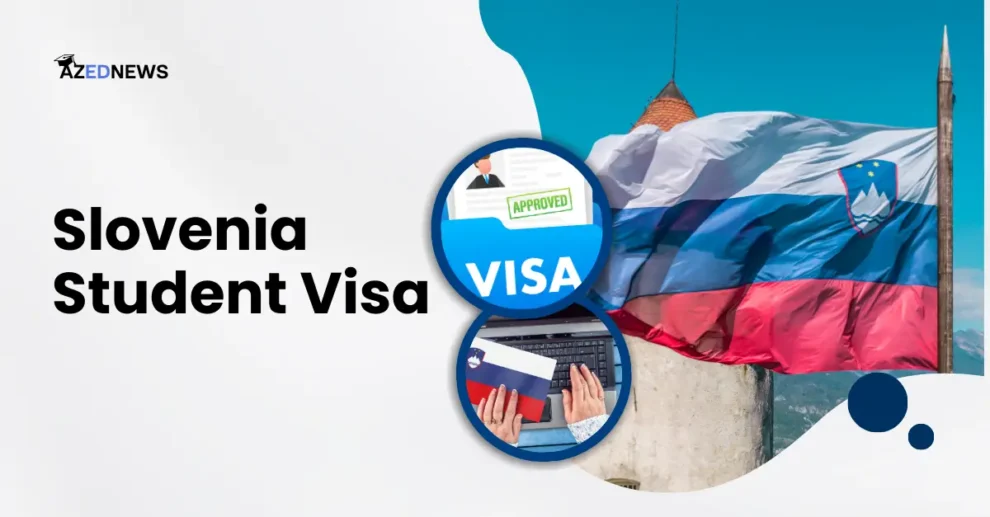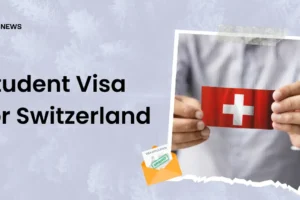If students plan to study in Slovenia, they will require a Slovenia student visa. Slovenia is a country in central Europe home to various top universities like the University of Maribor and the University of Ljubljana.
Table of Contents
English-taught programs in a range of topics, including business administration, engineering, and environmental sciences, attract students seeking quality education in those fields.
Slovenian institutions regularly grant scholarships based solely on academic performance, and their appeal is further enhanced by possibilities provided by the government and outside organisations.
Prospective students should check the official websites of institutions and relevant scholarship sources for the most recent information on courses, scholarships, and application processes.
To enter Slovenia for study purposes, students are required to apply for a Slovenia student visa about which we have described in this blog in detail.
Key Takeaways:
- Slovenia is a suitable option for most international students since this country houses various recognized universities, has affordable tuition fees, and has a diverse culture.
- The documents required for the Slovenia Student Visa include a National D visa application form, a valid passport, and recent photographs among many others.
- The Slovenia Student Visa procedure is quite simple and involves students submitting necessary paperwork, making an appointment, etc.
- The cost of a Slovenia student visa is around €77 and this does not include the cost of a residence card.
- Usually, it takes around 15 days for a Slovenia Student Visa to get processed.
- Students can work on a Slovenia student visa provided they submit a student work agreement.
- Some of the most popular universities for international students include the University of Maribor, the University of Ljubljana, etc.
Why should you study in Slovenia?
Studying in Slovenia can be a great option for many students who wish to pursue their education overseas. The several reasons are:
1. Recognized universities:
Numerous universities in Slovenia have received attention on a global scale for their exceptional academic offerings and noteworthy research achievements. These colleges provide excellent training in a wide range of areas, ensuring that students acquire an excellent education that is respected throughout the world.
2. Affordable tuition fees:
One compelling reason to study in Slovenia is the affordable tuition. The nation’s relatively low tuition rates, when compared to several Western European nations, make higher education accessible to a wide spectrum of students without compromising quality.
3. Programs in English:
Slovenian institutions are offering an increasing number of programs taught in English in an effort to draw in foreign students. This facilitates non-native speakers’ transition and allows students to complete their education in a language that is extensively used in academia and business.
4. Diverse culture:
Situated at the crossroads of European cultural influences, Slovenia presents a rich tapestry of cultural diversity. International students can study in a welcoming and pleasant environment in Slovenia, which allows them to meet individuals from many cultures and broaden their perspectives on the world.
5. Recognized globally:
International recognition for Slovenian university degrees opens doors to opportunities. Graduates from the country are highly appreciated in the global labor market due to the nation’s focus on maintaining high standards in education, which boosts their prospects of success in a range of professional sectors.
Who needs a visa to study in Slovenia?
In order to begin your studies at a Slovenian institution as a citizen of a non-EU/EEA nation, you must apply for a student visa. If you are from a nation that has a visa agreement with the Schengen region and you intend to stay in Slovenia for a period longer than ninety days, you will additionally require a student visa.
All long-stay visa applications must be filed at the Slovenian embassy. It should be noted that obtaining a long-stay visa for Slovenia does not grant you the ability to work or study in other Schengen nations.
What are the documents required for a Slovenia Student Visa?
To apply for a student visa, students will have to submit the following documents:
- National D visa application form:
Students should make sure they enter the correct information and provide the necessary details about their visa application.
- Valid passport:
The passport should be valid for at least three months after the departure date with a minimum of two blank pages.
- Recent photos:
Students should have one passport-size photograph that should be clicked as per the Schengen visa photo requirements.
- Acceptance letter from a Slovenian University:
The Ministry of Higher Education and Science should accept the letter submitted by the applicant.
- Travel health insurance:
Students will have to submit travel insurance with proof of medical coverage for emergencies during their stay in Slovenia.
- Proof of financial stability:
If you have been awarded a scholarship, you may provide that paperwork as evidence of your ability to pay; if not, you must present your bank statements or evidence that you will have housing during your visit.
- Letter of invitation:
The acceptance letter or letter of invitation should be written and signed by the Slovenian university or a guarantor.
- Proof of accommodation:
Students should also provide proof of having a student housing facility which could be a dorm or a rental agreement.
- Criminal record proofs:
Students should submit a document that proves that the applicant has no criminal record. Moreover, the documents should not be older than three months and should be translated into Slovenian and notarized.
- Proof of visa fee payment:
Students have to submit a receipt that shows that they have paid the visa application fee.
What is the process to get a Slovenia Student Visa?
To apply for a Slovenia Student Visa, students can follow the steps given below:
- Submit an application to study in Slovenia. You must first apply to and be accepted into a study program in Slovenia in order to be eligible for a student visa. You will not be granted a student visa if you do not have an acceptance letter.
- Make an appointment at the consulate or embassy that is closest to you. After your study program has been confirmed, find the closest embassy or consulate in your home country and schedule an appointment to submit your application.
- Gather the necessary paperwork. The embassy will give you a complete list of the documents you need to submit with your visa application.
- Submit a visa application. Students can apply after getting the paperwork read of their appointment at the embassy or consulate. At this time, the embassy can ask you to come in for an interview to discuss your plans to study in Slovenia.
- The last step is to wait for your application to be processed and your visa to be issued by the embassy.
Students have to fulfil the IELTS band requirements for universities in the UK to be able to apply in Slovenia universities.
Where should I submit my Slovenia student visa application?
Students will have to make an appointment for a student visa application and should apply at:
- A Slovenian embassy or consulate in the home country.
- A Slovenian embassy or consulate in a neighbouring country.
- An embassy or consulate of a Schengen country through which Slovenia allows visa submissions.
What is the cost of a Slovenia Student Visa?
Similar to other long-term visas in Slovenia, the student visa costs around €77. Additionally, students will have to pay the residence permit fee.
A temporary residence permit is required if the students want to continue their studies after three months. There are two fees for a residence permit. They are:
- The cost of the residency permit is €50 if you pay the price in Slovenia.
- The cost of the residency permit is €102 if you pay the price outside of Slovenia.
Students will also have to pay €15,47 to apply for a residence card.
How much time does it take to get a Slovenia Student Visa?
The entire processing of your student visa takes several weeks; at its fastest, it will take about 15 days, but it may take longer due to a variety of factors.
What is the duration of the Slovenia Student Visa?
A long-stay visa can be obtained for a maximum of three or six months. After entering Slovenia, you must then obtain your residence visa, which, depending on the length of your study program, may be valid for one to three years.
Can students extend a Slovenia Student Visa?
If you require additional time to finish your studies in Slovenia, you can extend your Slovenian student visa in addition to your residence permit. Your annual visa and permission extensions will be handled by your educational provider.
However, do remember that your student visa cannot be extended indefinitely. If you extend your studies beyond what is permitted, you risk being kicked out of the study program, which will revoke your student visa. You must finish your studies as you originally intended.
Can students work with a Slovenia Student Visa?
Yes, students can work in Slovenia with a student visa using a Student Work agreement. This specific agreement allows the university students to work part-time visa specific contracts known as referrals or referral forms.
Students who are looking for work in Slovenia should go to an employment agency that deals with students to see what kind of jobs they can get and how many hours they can work in a week.
Health insurance for students in Slovenia:
If a non-EU/EEA foreign student has no health insurance arrangements with Slovenia, they must organise and pay for their insurance before their arrival. The average monthly cost of health insurance is approximately €126.
The insurance will become active as soon as you enrol in classes at a university in Slovenia. Most international students work part-time jobs to help pay for their education and health care.
Students can use their EHIC to get the necessary medical attention in Slovenia for their health concerns if they have health insurance from an EU/EEA nation or Switzerland.
Can students get a permanent registration card in Slovenia?
In Slovenia, registration cards are available to students. A registration card has a five-year maximum validity period. But bear in mind that the government may choose to issue you with a registration card that is only good for the duration of your intended visit.
Universities in Slovenia for international students:
There are various universities in Slovenia for international students. However, the most popular universities are:
Tuition fees in Slovenia for international students:
Students can study for free at a public Slovenian university if they come from:
- A member state of the EU
- Bosnia and Herzegovina
- Montenegro
- Kosovo
- North Macedonia
- Serbia
International students are required to pay tuition fees as given below:
- Around 2,000 to 11,000 EUR for a Bachelor’s degree
- Around 2,000 to 15,000 EUR for a Master’s degree
- Around 2,000 to 6,000 EUR for PhD degrees
What is the list of courses taught in English in Slovenia?
To study in Slovenia, one does not need to speak Slovenian fluently. English courses are also offered by Slovenian universities. Without having to pick up a new language, international students can now simply study abroad in Slovenia.
Here is a list of Slovenian universities that provide English-taught courses to foreign students:
- Engineering programmes
- Business management programs
- Hospitality & tourism programmes
How to get a scholarship for international students in Slovenia?
Examine the possibilities offered by Slovenian universities, paying close attention to the prerequisites for each discipline and your academic record, to be considered for scholarships in Slovenia.
Look into government-sponsored scholarships, outside groups, and international programs. Keep in mind the requirements, deadlines, and documentation needed. Maintain an excellent academic record, highlight relevant experiences, and submit well-written applications.
To learn more about the different financing opportunities available, contact the scholarship department at your university.
Frequently Asked Questions:
1. How to get a Slovenia student visa?
To apply for a Slovenia Student Visa, students should follow the following steps:
– Apply for a study program in Slovenia.
– Set up appointments with the nearest embassy or consulate.
– Collect the recommended documents.
– Apply for a student visa.
– Wait for the result.
2. Is Slovenia good for international students?
Graduates from the country are highly appreciated in the global labor market due to the nation’s focus on maintaining high standards in education, which boosts their prospects of success in a range of professional sectors. For overseas students looking to study in Europe, Slovenia is a fantastic choice.
3. Does Slovenia accept the study gap?
A gap year can only be taken once while pursuing your education. Additionally, the extra year that is offered for completing final examinations and preparing a thesis will no longer be available.
4. Is it easy to get a PR in Slovenia?
After five years of residency in Slovenia and if the company is operational and financially stable, a permanent residence visa may be granted. The candidate for a residence permit must also demonstrate his ability to cover his costs. The road to citizenship can also be paved with residency.
5. Is IELTS required for Slovenia?
A solid command of the English language is a must for enrollment in Slovenian universities. To be admitted to the University of Ljubljana in Slovenia, applicants must obtain at least a 6 on the IELTS exam.
Conclusion:
Slovenian higher education has experienced fast institutional development, a number of structural modifications, and the introduction of new study programs in recent years.
Slovenia consequently gained popularity as a destination for overseas students. Slovenia presently has just around 2,000 international students studying there.
The vast majority of these students are from the former Yugoslavian nations, mostly due to linguistic and cultural ties. Approximately 10% of PhD students are international students.












Add Comment